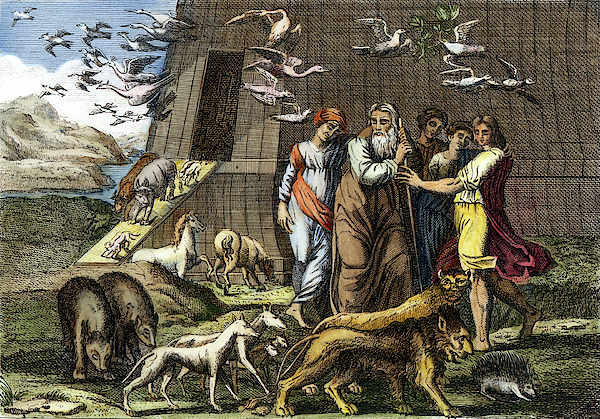In the six hundred and first year, in the first month, the first day of the month, the waters were dried from off the earth. And Noah removed the covering of the ark and looked, and behold, the face of the ground was dry. In the second month, on the twenty-seventh day of the month, the earth had dried out. Then God said to Noah, “Go out from the ark, you and your wife, and your sons and your sons’ wives with you. Bring out with you every living thing that is with you of all flesh—birds and animals and every creeping thing that creeps on the earth—that they may swarm on the earth, and be fruitful and multiply on the earth.” So Noah went out, and his sons and his wife and his sons’ wives with him. Every beast, every creeping thing, and every bird, everything that moves on the earth, went out by families from the ark.
Genesis 8:13-19

As the waters continued to recede from the face of the earth, Noah must remove the covering of the ark and survey the surroundings. The Hebrew word used for “covering” in the text is מִכְסֶה (“mik-seh”). The word is used 14 times over 12 verses in three books of the Old Testament – all within the Pentateuch (Genesis, Exodus, and Numbers). Each of these instances, the word is used to reference the skins of sacrificed goats or rams used in the construction of tents.
However, the Hebrew root word for mikseh is כסה (“ksh”), which is translated as to cover or conceal. This word appears 151 times in the Old Testament, and four of those times is specifically references forgiveness. Perhaps the best example of this usage is in Psalm 32:1.
“Blessed is the one whose transgression is forgiven,
Psalm 32:1 ESV
whose sin is covered.
Blessed is the man against whom the Lord counts no iniquity,
and in whose spirit there is no deceit.”
A couple of observations about the covering are worth noting:
- Purpose – The purpose of the covering was to protect the inhabitants of the ark and repel water from seeping into the ark from the rains. It likely was large enough to extend from bow to stern as well as from starboard to port sides.
- Provision – The provisioning of the covering was likely from animal skins cultivated from the atonement sacrifice of animals made prior to the flood. Just as the sacrifice of these animals provided a covering for Noah and his family against the judgement of God upon the world, the atoning sacrifice of Jesus provides a covering for us against the eternal judgement against sin.
We see though that this covering was temporary as it would have to be removed in order for Noah to survey the land and know that is was now safe to step out of the ark. Just as the temple sacrifices were temporary, when Christ was sacrificed on the Calvary as our atonement, the temporary has been replaced with the permanent as the veil has been torn away and we have direct access to the Father by the indwelling of the Holy Spirit in our lives.
The purpose of God’s provision of a covering is to protect us from His righteous judgement. As such, this makes it possible for us to trust His word and step out in faith into a new world, renewed and ready to begin again. I wonder if Noah and his family experienced any hesitancy when the door to the ark was opened. For nearly 18 months they had remained safe aboard the ark. It represented safety, shelter, warmth. But now it is time to step out in faith and obedience into something new.
In our human nature it can often be easier to rest in security of the old instead of stepping out into the unknown that lies ahead. A steady, well-paying job. A nice house. But in order to be obedient, sometimes it means a career change…a move to a new town…a downgrade in living arrangements – all for the sake of the Kingdom. Some coverings are temporary and are provided to serve a specific purpose. Sometimes that purpose is to preserve you and protect you and prepare you for something greater just over the horizon.
Sometimes we are called to step out of the ark onto the dry land. Other times, we see what Jesus is doing and we ask to step out of the boat into the raging storm. Both are steps of faith that require leaving behind the relative safety of the boat.